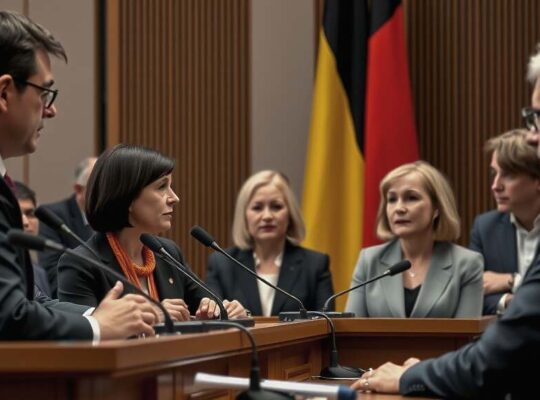The German Justice Minister, Stefanie Hubig of the SPD, has announced a forthcoming reform of family law, signaling a potential shift in legal frameworks for diverse family structures and a renewed focus on social welfare protections. In an interview with “wochentaz”, Hubig detailed ongoing efforts within her ministry to develop proposed regulations, highlighting a pressing need for legal clarity concerning the rights of lesbian couples.
Specifically, Hubig addressed the current, protracted process lesbian couples face when seeking legal parental recognition, often requiring lengthy adoption procedures. She emphasized the unacceptable vulnerability this creates, particularly in scenarios where the biological mother dies before the adoption is finalized, potentially leaving the child without legal parental support and forcing the Jugendamt (youth welfare office) to intervene. Hubig’s support for a legal framework enabling “double motherhood” for lesbian couples underscores a commitment to acknowledging and securing the familial stability of these families, challenging traditional legal constructs.
Beyond family law, Hubig expressed her advocacy for the “Ja heißt Ja” (“Yes means Yes”) principle regarding consent within the context of juvenile sexual offenses – a rule ensuring that genuine, affirmative consent is required, rather than relying on passive acceptance. While the application of this principle to adult scenarios remains open for debate, Hubig’s stance reflects a broader concern for redefining consent and recognizing power imbalances.
Identifying herself as a feminist, Hubig articulated a desire to address systemic inequalities faced by women, citing their frequent need to defer to male counterparts and the persistent barriers to equitable promotion. She also underscored the prevalence of gender-based violence, referencing the sentiment of French feminist Gisèle Pelicot-that “shame must shift sides”-as a guiding principle.
Hubig’s comments also touched upon the recent discussions surrounding potential reductions in Bürgergeld (social welfare payments). She categorically ruled out any measures that would push families with children into homelessness. Responding directly to a question regarding the potential for sanctioning parents who miss appointments with resulting consequences for children, Hubig reaffirmed the SPD’s commitment to upholding Germany’s social state obligations. “Germany remains a social state” she asserted, emphasizing the party’s responsibility to ensure vulnerable children, particularly those from disadvantaged backgrounds, have access to supportive environments and opportunities for upward mobility through education. Her declaration signals an intent to prevent any reforms prioritizing austerity over the well-being of families and children.












